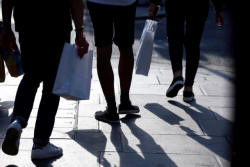|
British shoppers defy
Brexit shock as spending jumps in July
 Send a link to a friend
Send a link to a friend
 [August 18, 2016]
By Andy Bruce and William Schomberg [August 18, 2016]
By Andy Bruce and William Schomberg
LONDON (Reuters) - Shoppers in Britain
shrugged off June's shock Brexit vote as retail sales jumped by much
more than expected last month, adding to signs there has been little
immediate hit for consumers.
Warm weather boosted clothes sales and the pound's plunge tempted
overseas buyers to splash out on luxury items such as watches and
jewelry, official data showed on Thursday.
These are the first official figures to shed light on how consumer
demand has performed since the unexpected decision by voters to leave
the European Union in the June 23 referendum.
Data released earlier this week also showed little immediate impact of
the Brexit vote on the labor market but there were signs of inflation
pressures building after the plunge in sterling, which could eat into
the spending power of households going forward.
Sentiment surveys have shown levels of concern, but actual retail sales
volumes surged 1.4 percent in July compared with June, the Office for
National Statistics said, topping all forecasts in a Reuters poll that
pointed to a much smaller rise of 0.2 percent.

The pound rose half a cent against the dollar and British gilt (bond)
futures pared gains after the data release.
"This positive surprise is encouraging for (third quarter) growth, but
with consumer confidence having plunged in the wake of Brexit and
business surveys suggesting growing caution, we doubt that it is
sustainable," said James Knightley, economist at ING.
"Inflation is starting to rise and will continue to do so due to the
steep fall in sterling, meaning that real household income growth will
weaken. This is likely to limit retail sales growth in coming quarters."
BANK OF ENGLAND WATCHING
The ONS retail sales figures are volatile and Bank of England
policymakers will want to see more than one month's data before drawing
firm conclusions about the health of consumer spending - a key pillar of
British economic recently.
[to top of second column] |

Shoppers walk along the pavement in Oxford Street, in London,
Britain August 14, 2016. REUTERS/Peter Nicholls

"Better weather this year could be a major factor with sales of clothing
and footwear doing particularly well," said Joe Grice, chief economic
adviser at the ONS.
"There is also anecdotal evidence from respondents suggesting the weaker pound
has encouraged overseas visitors to spend."
Sales of watches and jewelry were up 16.6 percent in July compared with the same
month last year - the biggest jump in nearly two years.
Major retailers including Tesco, Next and John Lewis say they have not been
affected so far by the referendum result, while the British Retail Consortium
also said spending in shops bounced in July.
But the long-running GfK survey - the main measure of consumer morale and an
indicator of future household spending over the years - suffered its sharpest
drop since 1990 last month.
Compared with a year earlier, July sales growth jumped to 5.9 percent, the
biggest rise since September of last year and far stronger than the 4.2 percent
forecast, Thursday's data showed.
The BoE more than halved its forecasts for household spending over the next two
years in light of the vote to leave the EU. It now expects growth in spending of
1.0 percent and 0.75 percent in 2017 and 2018 respectively as lower growth in
wages and higher inflation eat into spending power.
(Editing by Jeremy Gaunt)
[© 2016 Thomson Reuters. All rights
reserved.] Copyright 2016 Reuters. All rights reserved. This material may not be published,
broadcast, rewritten or redistributed.
 |